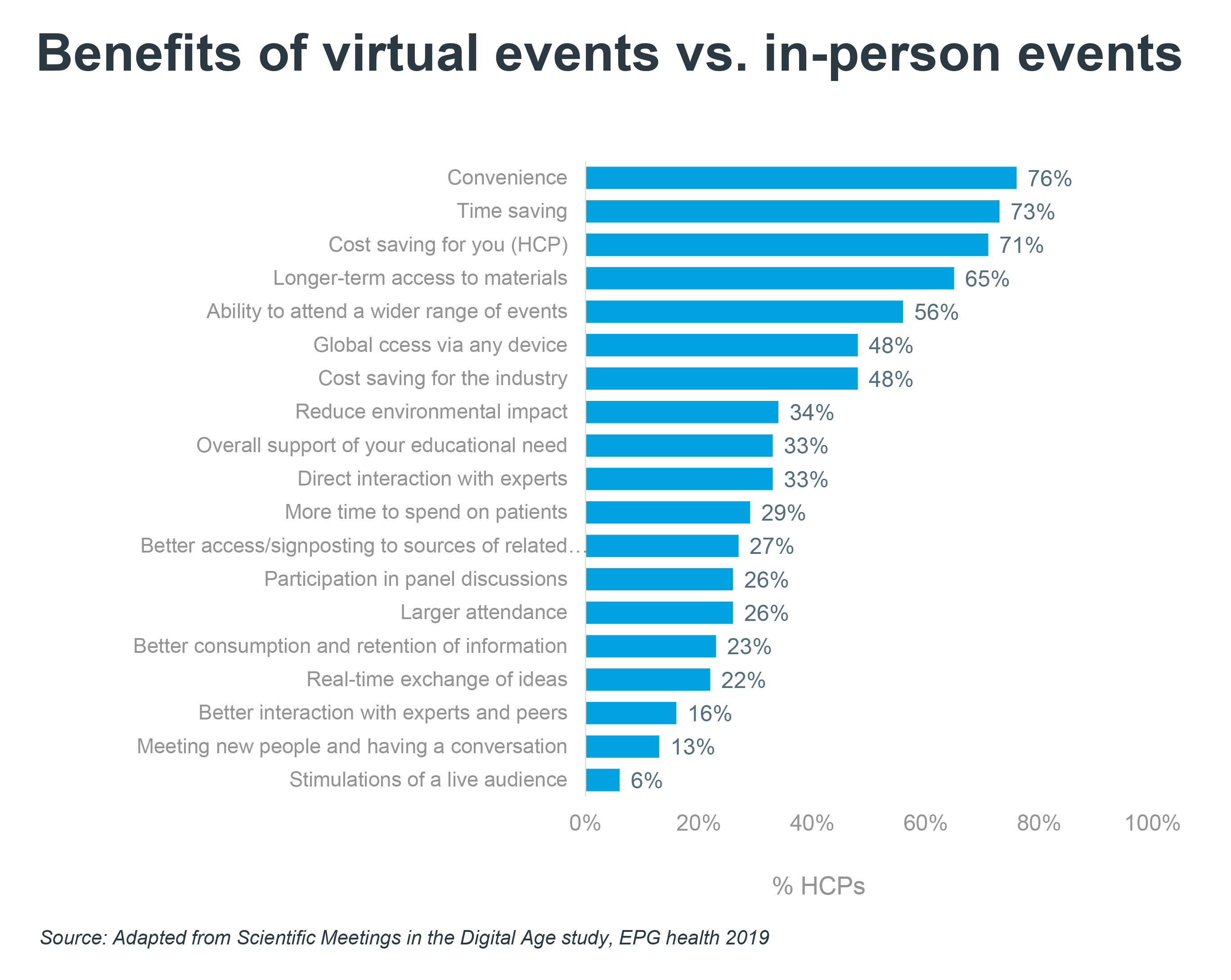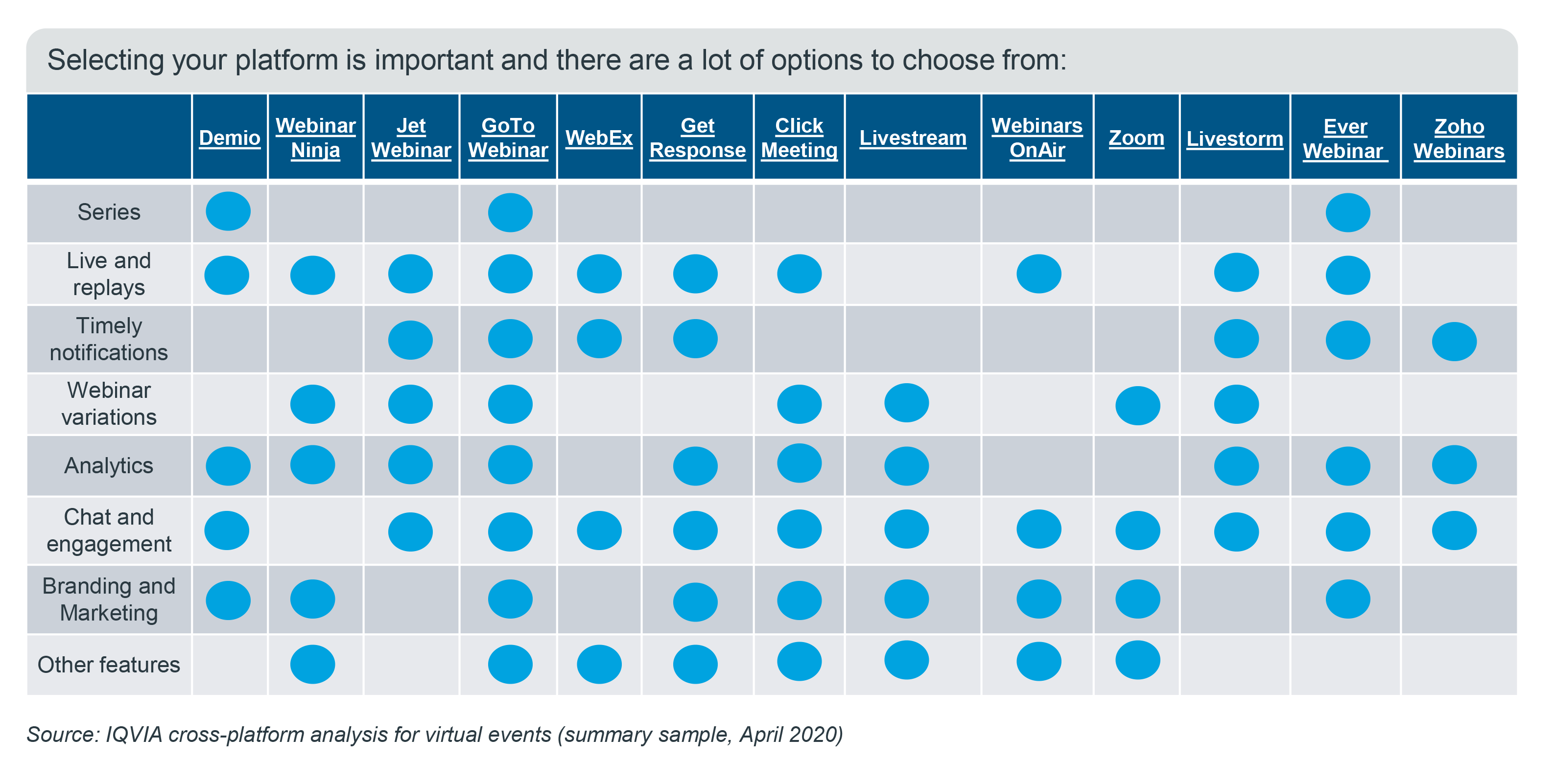















- Locations
- United States
- US Blogs
- Hosting Virtual Conferences: How to Improve the Experience for HCPs
Virtual conferences have been popular among healthcare professionals (HCPs) for some time. In fact, in one survey of oncologists in 2016, a majority believed that by 2021, they would attend between 20 and 100 percent of medical conferences remotely1. And that, obviously, was before anyone anticipated the COVID-19 pandemic!
The primary benefit that HCPs see in virtual events is convenience and the time savings that goes with not having to travel. However, in comparison to live events, HCPs rate virtual conferences poorly in terms of their lack of audience stimulation and their inability to provide opportunities to meet new people, interact with experts, and exchange ideas. But what if there were ways to mimic the live meeting experience, or at least to come closer to it, when engaging with HCPs remotely?

Breathing Life into Virtual Conferences
In a recent webinar, “Remote Engagement: Virtual conferences that promote connection and exchange,” IQVIA offered several suggestions for improving upon the experience for HCPs2 . These apply whether you’re creating your own branded conference or aligning with an existing strong brand.
- Spread it out. Spread content out over time, with no more than three, 2-hour sessions per day. Additionally, create hubs, especially for global conferences.
- Limit large plenary presentations. Focus on one thought leader per session, or create panel discussions.
- Use a platform that allows attendees to be seen. Attendees like to be seen by Key Opinion Leaders (KOLs), so ensure that people can be seen when they ask questions of speakers/panelists.
- Build in breakout sessions. Design the virtual event platform with a map and direct links to distinct “rooms” to create the mental separation of topics.
- Allow for breaks. Build in a 5-10 minute break for every 50 minutes of presentation and one hour for lunch to allow for sustenance and networking.
- Offer poster sessions. Provide a template for posters that can be published online around the conference dates. You can use Twitter, for example, as a platform for the postings. This will increase reach and strengthen your brand on social media. The exposure generated for the authors and their content will also increase the appeal of participating in future iterations of your event(s).
- Use social media to support the experience. Interactive social media can be used to engage attendees, to “entertain” during breaks, and to support aspects of the conference, such as poster sessions (see above).
- Consider “speed mentoring.” Replace the networking aspects of live conferences with one virtual “speed mentoring” session per block of presentations in which each attendee gets a few minutes to chat 1:1 with a mentor. This can be built into speaker contracts and is sure to be appealing to mentors and mentees. By observing who chooses to mentor whom and vice-versa, you also get to learn about the interests of established thought leaders and rising stars.
- Ensure speakers are video-ready. Presenting to the camera is a different skill set than presenting to a live audience, and coaching speakers can be an opportunity to retrain practiced presenters – another opportunity to showcase to thought leaders the value you bring to their engagement.
Creating Differentiation with Your Platform
There are over a dozen different platforms to use in hosting your event, and they each offer a variety of features. Explore the options and consider the features that will be important to elevating the experience for your attendees. It is wise to select your platform well in advance of the event because the technology could be instrumental in tracking engagement. Ultimately, you’ll want to be able to analyze the time that attendees spend in different sessions, what questions they ask, and what interactive elements (polls, chats, etc.) they take part in.

To supplement these insights, also be sure to view two earlier blogs from IQVIA on the topic of Digital Engagement, one about maximizing the impact of digital events with HCPs, and another about using virtual events to track customer engagement over time. Both provide additional tips for making the most of the virtual world in your relationship with HCPs today... and in the future.
1 The Future of Medical Conferences, FirstWord (2016) n = 85 oncologists worldwide.
2 These build upon ideas drawn from “How to organize an online conference” by Reshef, O, Aharonovich, I., and Armani, A.M. et al, published in Nat Rev Mater 5, 253-256 (2020).

Accelerating the Path to Digital Engagement
Learn best practices for multi-channel customer engagement and how to implement agile, scalable initiatives by viewing this webinar series on demand.




